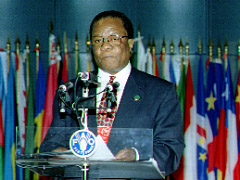


SWAZILAND - SWAZILANDIA | ||
The Honourable Barnabas Sibusiso Dlamini, Prime Minister of the Kingdom of Swaziland | ||

May I, on behalf of the King of the Kingdom of Swaziland, the Government and the entire Swazi Nation, express my Delegation's profound appreciation to be given this rare opportunity to address this august Summit on food. Before I proceed with my brief statement, however, I wish to thank most sincerely the Italian authorities and the FAO Secretariat for the excellent arrangements that have been made to facilitate the participation of my Delegation at this important gathering. It is over two decades ago since the World Food Conference was held. At that Conference the world community pledged its unanimous commitment to the eradication of hunger and malnutrition. It is, however, disheartening to observe that today these problems are still very much alive and deteriorating in some regions. It is within that context that my Delegation strongly supports the Plan of Action that will clearly indicate as to how, this time, hunger and malnutrition will be eradicated. The leadership of FAO will be very crucial in assisting Member Nations, particularly low-income food-deficit countries, in developing and implementing food security strategies. The problems of hunger and malnutrition continue to haunt some developing countries, particularly those in sub-Saharan Africa. This situation prevails despite the recent modest economic recovery in several of these countries. Since food security essentially means access to safe and nutritious food to maintain a healthy and active life for all people at all times, it goes without saying that the main cause of hunger is poverty. Such poverty is brought about by a complex set of problems including civil and political conflict, a high rate of population growth, disease, natural disasters, unemployment, degradation and deterioration of the natural resource base, illiteracy and many others. It is most unfortunate that the main victims of poverty, and consequently hunger and malnutrition, are the most vulnerable groups in our societies. These include women, children, the aged, the disabled and those who have been displaced from their places of origin. If, therefore, we are to effectively tackle the problem of food insecurity, poverty alleviation or eradication should be our target. My Delegation wishes to submit that any country or continent is the master of its own destiny. This however does not in any way suggest an isolationist approach in grappling with one's problems. On the contrary, we would like to suggest that development policies, including those of food and agriculture, should be spearheaded by the affected country or continent itself, whilst the much-needed external assistant acts as a propelling agent for those homegrown policies. It is for this reason that as we approach the twenty-first century, we in Swaziland are presently reviewing all major policies that affect the lives of our people. These include economic, social, political and constitutional review processes. We have also embarked on the preparation of a national development strategy the time-horizon of which is expected to be the next 25 years. It is our conviction that there is a need to review and establish an effective and efficient public service which should facilitate the activities of the private sector. Consequently, a public sector management programme is presently underway. In the short-term, however, we hope to implement an economic and social reform agenda the main thrust of which is to kick-start the economy which has already indicated less than optimal growth. We have also started to review our agricultural policies such that our farming activities become more competitive in the southern African sub-region and elsewhere. One common feature amongst all these policy initiatives is that they are being planned and will also hopefully be implemented by us in Swaziland. In pursuing this course of action, we shall draw very heavily from experiences elsewhere. Whilst it is accepted that the food security issue is very diverse and complex, my Delegation also submits that our approach in searching for solutions should not be equally complex. Some areas which may need immediate attention in order to redress the food situation include, development of effective agricultural policies and improvement of productivity from our agricultural communities. Examples of these measures in Swaziland have included liberalization of produce prices, allowing greater participation of the private sector in the marketing and distribution of agricultural commodities and inputs, and institutionalization of cost-recovery policies with respect to livestock and mechanization services. We also believe that smallholder irrigation development should be accelerated. All this, however, cannot be possible unless our research and extension services are improved, particularly in the area of training so that our farmers can have access to more productive and relevant technologies. My Delegation is aware that the preparations and negotiations leading to this Summit have not been easy. There have been periods when the success of this meeting was in doubt. We are, however, very pleased that such negotiations have been successful and this hopefully will lead to the eventual eradication of hunger and malnutrition wherever they exist. I would like to thank the Director-General of FAO, the Committee on World Food Security and all member countries of FAO for putting so much effort into making this historic occasion the success that it is. Before I conclude, permit me to observe that the mere presence of so many distinguished leaders of member countries of FAO to deliberate on this basic and yet crucial issue of food provides a glimmer of hope and encouragement that at last the international community is determined to eradicate the scourge of hunger and malnutrition for each and every citizen of this global family. For our part in Swaziland, we pledge our unwavering political and moral support to the ideals and objectives of FAO particulary as a United Nations agency of professional excellence in the areas of food, agricultural and rural development. | ||

 |